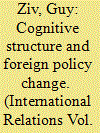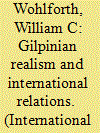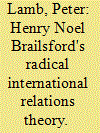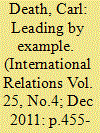|
|
|
Sort Order |
|
|
|
Items / Page
|
|
|
|
|
|
|
| Srl | Item |
| 1 |
ID:
110845


|
|
|
|
|
| Publication |
2011.
|
| Summary/Abstract |
Rationalist explanations of foreign policy change are underdetermined because they overlook the decision-makers themselves. Insight from cognitive psychology shows that individuals' cognitive structures provide a useful lens through which to understand why some people are more likely than others to change their core beliefs. Two related cognitive variables - cognitive openness and cognitive complexity - hold promise for enhancing extant explanations of foreign policy change. This article assesses the cognitive structure of the three leaders who dominated Israeli decision-making in the decade leading up to Israel's dramatic policy change vis-à-vis the PLO in 1993: Yitzhak Shamir, Yitzhak Rabin and Shimon Peres. The article demonstrates that Peres, who is found to be the most cognitively open and complex, was quicker to embrace a dialogue with the PLO than Rabin, while Shamir, who is found to hold the lowest levels of openness and complexity, rejected this move altogether. Peres, and to a lesser extent Rabin, proved to be more sensitive to international, regional and domestic changes than Shamir. This case illustrates that systemic-structural and domestic political factors are necessary, but insufficient, conditions for foreign policy change. The levels of decision-makers' cognitive openness and complexity are key to determining the likelihood that they will change their beliefs on a core policy issue that can, in turn, lead to foreign policy change. This article thus contributes to our understanding of both foreign policy change and the process leading up to the historic 1993 agreement between Israel and the PLO.
|
|
|
|
|
|
|
|
|
|
|
|
|
|
|
|
| 2 |
ID:
110844


|
|
|
|
|
| Publication |
2011.
|
| Summary/Abstract |
Recent world politics displays two seemingly contradictory trends: on the one hand, the incidence of international and even civil war shows a very great decline, but on the other hand the US, and to a lesser extent Britain and France, have been involved in many military adventures since the end of the Cold War. The causes are numerous, but among them is the unipolar structure of world politics, which presents the US with different kinds of threats and new opportunities. Central also is the existence of a security community among the leading states. A number of forces and events could undermine it, but they seem unlikely to occur. Even in this better world, however, recessed violence will still play a significant role, and force, like other forms of power, is most potent and useful when it remains far in the background.
|
|
|
|
|
|
|
|
|
|
|
|
|
|
|
|
| 3 |
ID:
110848


|
|
|
|
|
| Publication |
2011.
|
| Summary/Abstract |
I argue that realism in particular and IR more generally erred by assigning Kenneth Waltz's Theory of International Relations pride of place in revivifying realist thought. Had Robert Gilpin's War and Change in World Politics been given equal billing, international relations research would have unfolded quite differently over the past three decades. Scholars would not have been bewildered by change, bewitched by the balance of power, blind to numerous potentially powerful realist theories, and bothered by endless and unproductive zero-sum debates among representatives of competing paradigms. And had all those pathologies been absent, we would be far better prepared today for the intellectual and policy challenges of a world in which underlying power balances appear to be changing quickly, and the status quo inter-state order is ever more contested.
|
|
|
|
|
|
|
|
|
|
|
|
|
|
|
|
| 4 |
ID:
110847


|
|
|
|
|
| Publication |
2011.
|
| Summary/Abstract |
Compared with some of his contemporaries Brailsford is relatively neglected today. He offered incisive analysis of the international relations of his times, discussing political and economic aspects together. He grounded his contributions upon a view of human nature that drew on the ideas of Godwin, Shelley and Condorcet. A cosmopolitan, socialist political philosophy also underpinned his work. Brailsford was sharply critical of balance-of-power theory, which served to veil the actual intentions of statesman and the capitalist entrepreneurs whose policies they benefited. He was also critical, like Laski, of sovereignty theory which masked the dominance of capitalist interests in the modern state and international system. Over several decades these aspects of his work contributed to his proposals for a radical league of nations. His work will be of interest to IR scholars today.
|
|
|
|
|
|
|
|
|
|
|
|
|
|
|
|
| 5 |
ID:
110846


|
|
|
|
|
| Publication |
2011.
|
| Summary/Abstract |
Global environmental politics is emerging as a key field for South African diplomacy and foreign policy, in which Pretoria is endeavouring to lead by example. Environmental summits and conferences such as Johannesburg (2002) and Copenhagen (2009) have been crucial stages for the performance of this role as an environmental leader, and in December 2011 Durban will host the seventeenth Conference of the Parties (COP17) to the United Nations Framework Convention on Climate Change. There are also signs from within policy-making circles that 'the environment' is seen as a field in which some of the lustre of South Africa's post-1994 international high moral standing could be recovered. However, tensions remain between South Africa's performance and rhetoric on the global stage, and domestic development paths which continue to be environmentally unsustainable. The article concludes by suggesting that while the visibility and prominence of South Africa as an actor in global environmental politics is likely to grow, it remains doubtful whether this represents a sustained and committed new direction in South African foreign policy.
|
|
|
|
|
|
|
|
|
|
|
|
|
|
|
|
|
|
|
|
|